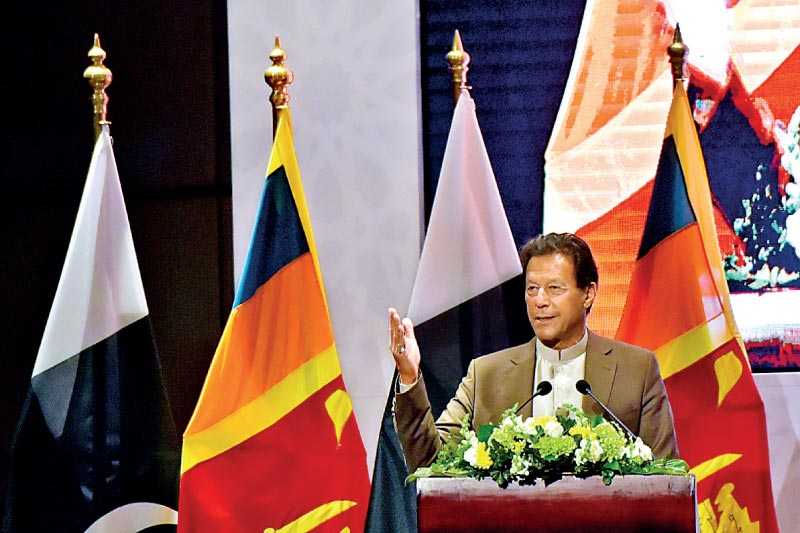Pakistan Prime Minister Imran Khan yesterday highlighted dialogue, technology and trade as the top three ways for South Asia to tap its full potential, inviting Sri Lankan businesses to invest in the China Pakistan Economic Corridor (CPEC) and insisting that wealth creation was the best way to lift millions, in both countries, out of poverty.
Addressing a business and investment forum that saw the participation of top officials and private sector representatives of both countries on the second day of his visit, Khan emphasised the importance of using trade to improve connectivity between South Asian countries, reduce the emergence of political disputes and reduce economic inequality.
“We have a relationship that has huge potential. From Pakistan’s point of view I think the most we can learn from Sri Lanka is tourism because you have a much more advanced tourism industry compared to us. Pakistan has huge potential in tourism but that is being discovered by locals and not foreign tourists. Sri Lanka’s tourism is on a different level to ours. We would like to have contact with you in developing resorts around Pakistan,” he told the gathering.
Khan was enthusiastic of untapped religious tourism between the two countries, pointing out that Pakistan was once home to the Gandhara Buddhist civilisation, which his Government is keen to develop as part of a larger Buddhist trail. He also backed joint development of Pakistan’s coastal tourism with support from Sri Lanka.
Giving China’s phenomenal rise as an economic super power as an example for South Asia the Prime Minister pointed out that China had managed to lift nearly 700 million people out of poverty within one generation by reducing conflict with their neighbours and forging ties based on investment and trade. Advocating South Asia to follow the same blueprint he called on Sri Lankan businesses to tap CPEC assuring Government support for companies.
“I would like to ask the business community of Sri Lanka to participate in our CPEC project. It opens up opportunity for Sri Lankan businesses right up to Central Asia. It gives you the opportunity of connecting from Gawadar Port right up to Uzbekistan and CPEC also has special zones that provide incentives for businesses to set up along the corridor. So I invite Sri Lankan businesses to make use of this opportunity. Pakistan will welcome you.”
Khan also praised China’s use of technology in agriculture and said he was keen to learn from their experiences, which he said had been mentioned by President Gotabaya Rajapaksa during their meeting yesterday morning.
He went on to draw a link between poverty and the development of a welfare State, arguing that wealth creation by the private sector was the best antidote to inequality. Khan also emphasised that under his leadership the Government had worked to roll back red tape and improve the business environment resulting in Pakistan climbing 28 positions in the latest World Bank’s Ease of Doing Business rankings and becoming one of the fastest reforming economies in the world.
“Technology is one way we can reduce poverty. The other way is through investment. It is by promoting profitability and business. We have changed our policies in Pakistan, which have sadly been in place for 40 years, where the mind-set was against profitability and against businesses.
“The whole Government structure evolved such it was an impediment to business and the business community. So we have been trying to change this mind set in the last two years and reducing the impediments, which translates to the ease of doing business, and we improved 28 spots.”
“The whole idea is that we generate wealth and from that we can spend on the bottom half of our population and lift them up from poverty, which is what China did. I must say this about China. No country in history has taken out almost 700 million people out of poverty in 30-35 years. It has never been done before. So this is something the President and I discussed.”
The Prime Minister acknowledged that even though his efforts to improve Indo-Pakistan relations since coming to power were unsuccessful he remained optimistic that India will eventually realise that the best way forward for the subcontinent was through dialogue.
“The third thing you need to create wealth in any country is stability. So immediately when I came to power I approached our neighbour India and explained to Prime Minister Modi that the way forward for the subcontinent is to resolve our differences through dialogue, then improve our trading relationship and defuse tensions. I didn’t succeed but I’m optimistic that eventually sense will prevail that the only way we in the subcontinent can get people out of poverty is have trading relationships.”
Khan remarked on the example of Germany and France, which had been warring for centuries but had evolved past their differences and were now the strongest allies within the European Union. He advocated for South Asia to follow a similar path and resolve the Kashmir issue and move towards stronger political and economic partnerships.
“Conflicts and political tensions are subservient to trade, investment and business. The same should apply to the subcontinent. So we need to resolve our differences through dialog because otherwise we will not trade and the potential of the subcontinent with its over 1.3 billion people will not be tapped.”
He also said Pakistan should explore its potential on the global stage.
“I believe Pakistan can play its role in reducing rising tensions between the US and China. Some 50 years ago it was Pakistan and helped open up China to the US. Rather than being part of rivalries Pakistan would like to become a country that brings other countries and humanity together.”
(FT)

